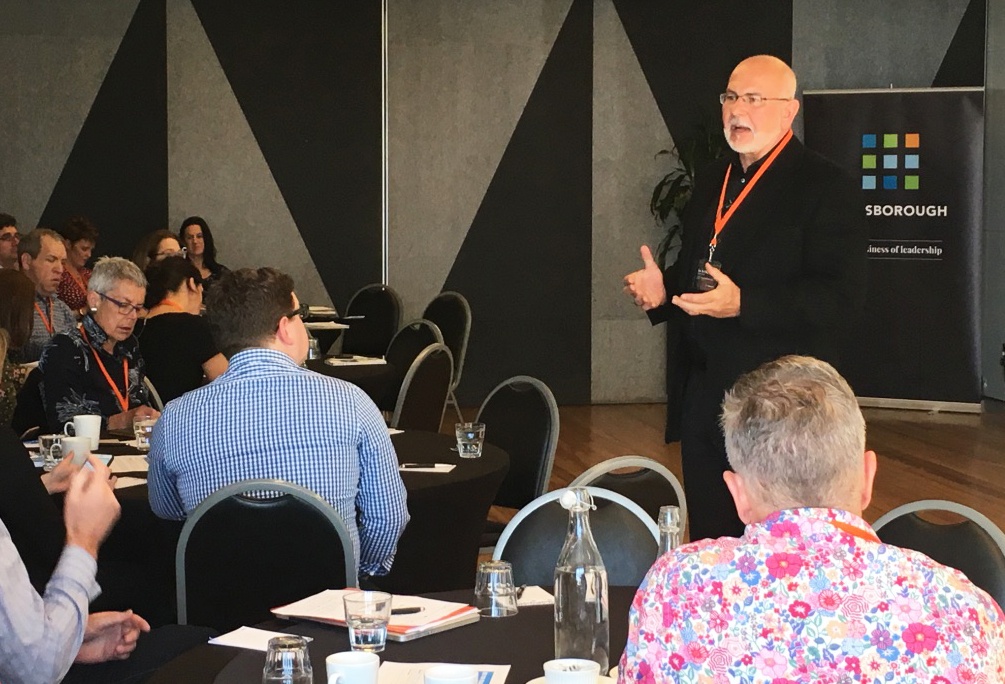
Winsborough’s Future Trends 2018 Conferences have been a wonderful opportunity to bring together some of the world’s foremost experts in leadership and teamwork to discuss and impart valuable knowledge on the future of teams – how teams will operate and develop. This year’s conferences have had a particular focus on creating high performing teams in a fast-paced technological environment.
That’s why we were thrilled to announce that our 2018 keynote speaker was Dr Gordy Curphy. Dr Curphy, who was over to join us from Minneapolis, USA, is a global leadership and senior teams expert. He is also the creator of the Rocket Model, developed based on 20 year’s of research working with thousands of teams, which provides leaders and facilitators with a practical roadmap for transforming collections of individuals into high performing teams.
Dr Curphy has spent the past 35 years providing consulting advice on leadership and has written more than 20 books on leadership and teams. As a consultant, he has conducted more than 1,500 executive assessments, and designed and delivered hundreds of executive coaching and leadership development programmes to global clients. So he knows his way around teams.
At the conference Dr Curphy started off the day by setting the scene, focusing on the type of environments and things that organisations can do to encourage great teamwork. In this blog we look at the key points from Dr Curphy’s presentation.
Click here to watch the highlight reel from Future Trends 2018.
6 things organisations can do to foster effective teamwork
1. Start at the top
Effective teamwork has to start at the top, with the top team needing to manifest effective teamwork. This might sound straightforward, but it’s not as easy as you might think. Organisations put their best at the top – but they don’t always play nicely together! The team then consists of ‘alpha’ personalities often causing ‘alpha paralysis’. A huge team of the ‘best’ just isn’t effective for this reason and you typically end up with ‘cloning’ of personalities and no diversity (diversity in this sense is much more than simply race, gender and age, it’s diversity in cognitive ability too). This can mean that as the top team can’t agree on the big issues, they tend to only reach agreement on the smaller issues.
Unfortunately, failure can be caused by everyone looking at the world in the same way and can create an artificial harmony where in team meeting things seem to look harmonious but there is disagreement in the background.
2. Provide a roadmap
A roadmap showing the direction the company is heading in is crucial – it’s then a common framework that everybody understands and everyone can shoot for.
3. Enable team leaders
Leadership is a ‘team sport’ and leaders need to be equipped (enabled) with the fundamental skills to understand where the team is at and what can be done.
4. Bake it in
Teamwork skills need to be looked for in candidates when hiring - they should be factored into the hiring criteria as well as when developing staff. A way to do this is to look at their team-building track-records, rather than just their individual skills. And remember, don’t confuse intelligence with teamwork skills - highly educated and intelligent people aren’t necessarily better at teamwork.
5. Measure it
To know if something is working you need to measure the results. This is also the case for teams - leaders need to be given feedback from the rest of the team to know if things are operating effectively and as the leader would like. This is because there’s typically a large difference between the team leader’s view and how the team sees it.
6. Don’t overdo it
Not every task is best handled by a team. Some things are better handled by a sub-team or an individual – it all depends on the task. Don’t assume that everything should be worked through in a team or you will end up having collaboration overload! Save your teamwork for tasks that are suited to it.
---------------------
With his wealth of experience and talent for ‘straight talking’ Dr Curphy was the ideal speaker to present critical insights into fostering and supporting effective teamwork.
The insights he provided can be put into context with his thought-provoking statement “sometimes it’s the soil not the seed that inhibits effective teamwork.”
Perhaps we need to be looking at the environment that the organisation is fostering for successful teamwork rather than at solely the team.
Click here to watch the highlight reel from Future Trends 2018.
